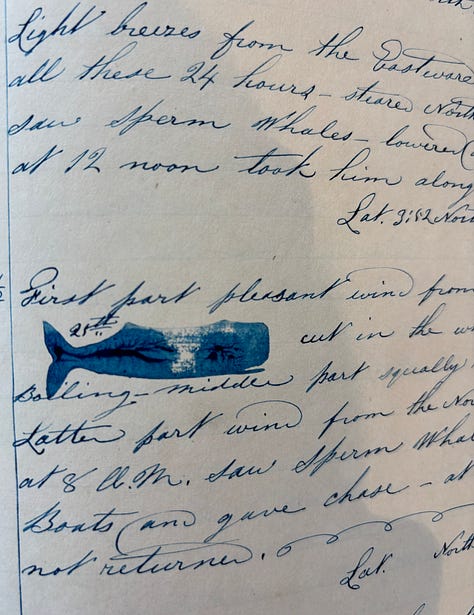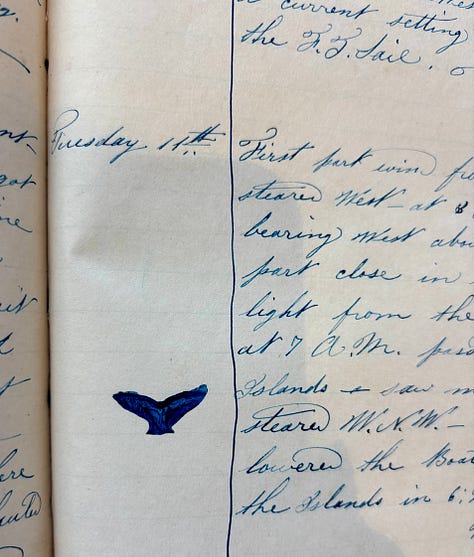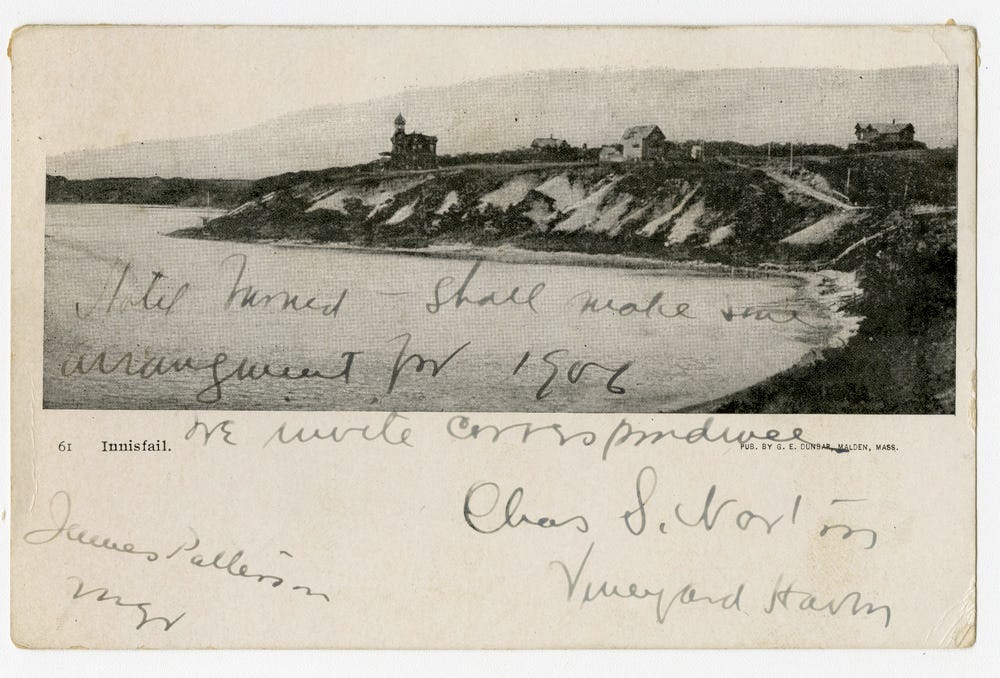How to time travel
Finding sparks of writing inspiration in local historical societies on the Vineyard and beyond
If you could have a superpower, what would it be? The ability to fly? To turn invisible? To read minds?
Me, I want to time travel. Not to the future, but into the past. I’m researching and writing about Tom Karl, a 19th-century tenor who ran a music colony on the Vineyard he called Innisfail. What I would give for a day, an hour, in his presence.
But while we can’t travel back in time (sigh), we can visit local historical societies and museums. Examining objects from the past can cast a spell that enriches our writing.
I still recall a moment, years back, finding a yellowed envelope postmarked 1907 in the closet of the cottage I was renovating. The brittle pages within detailed, in a blue fountain-pen scrawl, Tom Karl’s life a year after Innisfail burned down. He’d gone to California to try to restart his career. Reading that letter, I could feel the regret and resignation that pulsed through him a century before.
Nothing compares to holding history in your hand.
Writers with creative projects set in the past understand. Vineyard author Paul Magid, for example, told me how treasures at our local history museum helped him write his new book, the richly detailed Pursuing the Leviathan.
Paul’s book tells the story of Vineyarder Benjamin Clough, part of the crew of the whaling ship Sharon, whose cruel tyrant of a captain was murdered by three crewmen when Clough and the rest were out on smaller boats pursuing whales. The log of the murdered captain is one of over 100 whaling ship logs in the MV Museum’s collection.
To find such objects, it helps to have a knowledgeable guide—like the Museum’s research librarian, Dr. Bow Van Riper. Bow, Paul, and I met recently to chat about the collection, including the Sharon’s log, a heavy, leather-bound book.
I pored over the log’s daily entries, written in a tight, elegant hand. Many pages were illustrated with hand-carved stamps. The middle photo below, of a full whale, indicated a successful catch. But the frustration of a miss came through in the inky dark stamp of a disappearing whale fluke.
The logbook’s final pages were ripped out after the captain’s murder. Bow, Paul, and I tossed around ideas of who would’ve had motivation to destroy those pages and what they might’ve contained.



Like Paul, I’ve spent hours in the Museum’s library, thumbing through old photo albums and scrapbooks for a Museum exhibit on Tom Karl’s Innisfail.
Other archives that’ve helped me imagine the world of Innisfail include newspapers from Rochester, Boston, and Connecticut (found on Newspapers.com) that regularly reported the doings of Innisfail guests.
But to create the museum exhibit I envisioned, I needed more than online newspaper clippings. I started a googling frenzy, pairing the word Innisfail with names of other performers Tom Karl performed with. One “bingo!” moment came with surname Barnabee : The Portsmouth Public Library held the Henry Clay Barnabee collection, including a postcard of Innisfail he received in 1906 from a Vineyarder that reads: “Hotel burned.”

This online find spurred me to spend four long days in the Barnabee archive. I don’t think he threw away a single clipping or poster or photo in his lifetime, and for that I am grateful.
A few months later, another eureka moment while scrolling through the online portal of a New York research library.
Tom Karl never recorded his voice. But in the New York Public Library for the Performing Arts collection, there it was: a recording of Barnabee with two other members of Tom Karl’s opera troupe.
Over the crackle of the century-old recording, their voices rang out clear, strong. Closing my eyes, I listened for their breath. Barnabee I recognized at once: a professional comedian, he joined the trio by drawing out his first note far longer than the music could’ve possibly called for. The soprano struggled to suppress a giggle (and failed).
For a moment, I could “see” them, these people I’m writing about, as they experimented with new technology and made music together.
Archives and archivists deliver moments like these. They help me imagine a world that—unless the gods descend and grant me that time-travel superpower—I will never experience. They help spark scenes and characters from long-ago era. Now all I have to do is try to put their into words on paper.





I can’t wait to see this exhibit! Nothing I like better than time traveling.
Brenda! What a great post. I'm with Tracey--that little whale fluke hit me, too. But also the photo of the grand hotel, and the urgency of your quest. You're breathing new life into forgotten stories and characters. A noble calling.